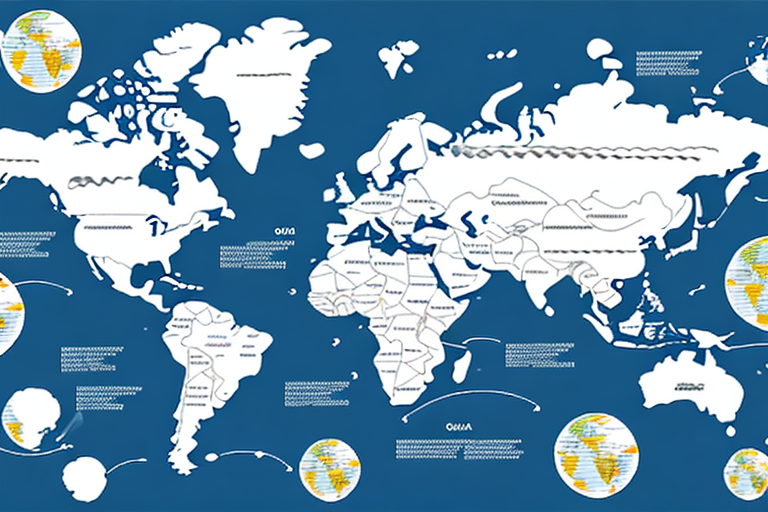Understanding the Handling of Non-Standard Packaging in UPS Worldwide Express Freight International Shipping
As businesses continue to expand their global reach, shipping non-standard packages—those with irregular shapes, sizes, or weights—has become increasingly common. These packages present unique challenges during transportation, requiring specialized handling to ensure safe and efficient delivery. This article delves into the best practices for transporting non-standard packaging through UPS Worldwide Express Freight International Shipping, offering insights backed by industry data and reputable sources.
What is Non-Standard Packaging?
Non-standard packaging refers to shipments that fall outside the typical size, shape, or weight parameters established by standard package categories. These can include oversized items, irregularly shaped goods, or packages containing hazardous materials. Additionally, non-standard packaging may require specialized handling or storage conditions, such as temperature-controlled environments for perishables or extra padding for fragile items.
Proper labeling and clear communication about the nature of non-standard packaging are crucial. This ensures that carriers adhere to the necessary safety and handling protocols, facilitating smooth transportation and timely delivery.
Types of Non-Standard Packaging
Non-standard packaging encompasses a wide range of items, each with distinct handling requirements:
- Oversized Items: Furniture, machinery, and vehicles that exceed standard dimensions.
- Fragile Items: Glassware, artwork, and delicate equipment requiring extra protection.
- Hazardous Materials: Chemicals, batteries, and other materials that pose safety risks.
- Perishable Goods: Food, flowers, and pharmaceuticals needing temperature-controlled environments.
Each type necessitates specific packaging solutions and adherence to regulatory standards to prevent damage and ensure compliance.
Why is Proper Handling of Non-Standard Packaging Important?
Improper handling of non-standard packages can lead to significant risks, including product damage, increased costs, and safety hazards. Adhering to specific guidelines and safety procedures is essential to:
- Ensure the integrity of the shipped products.
- Minimize liabilities and potential legal consequences.
- Maintain timely delivery schedules, enhancing customer satisfaction.
For instance, oversized or overweight packages may require specialized equipment like forklifts or cranes for loading and unloading. Carriers lacking the necessary training or equipment can inadvertently cause accidents or injuries.
Moreover, packages containing hazardous materials must comply with stringent labeling and handling regulations to prevent environmental harm and ensure public safety. Non-compliance can result in substantial fines and legal repercussions.
The Challenges of Shipping Non-Standard Packaging
Shipping non-standard packaging introduces several challenges that businesses must navigate:
- Custom Packaging Requirements: Creating bespoke crates, pallets, or cages adds complexity and cost to the shipping process.
- Increased Risk of Damage: Non-standard packages may not fit securely on standard shipping equipment, leading to shifting and potential damage during transit.
- Operational Delays: Custom packaging and additional documentation can prolong the shipping timeline, affecting delivery schedules.
- Regulatory Compliance: Navigating varying customs regulations across different countries requires meticulous attention to detail to avoid delays or returns.
Addressing these challenges requires strategic planning, investment in specialized packaging solutions, and collaboration with experienced shipping partners.
UPS Worldwide Express Freight International Shipping: A Reliable Option for Non-Standard Packaging
UPS Worldwide Express Freight International Shipping offers a dependable solution for shipping non-standard packages. With a robust global network spanning over 220 countries and territories, UPS provides comprehensive services tailored to handle the complexities of irregular shipments.
UPS offers various transportation modes, including air, ocean, and ground options, ensuring flexibility and efficiency in delivery. This versatility allows businesses to choose the most suitable and cost-effective method based on their specific needs and timelines.
Additionally, UPS is renowned for its exceptional customer support. Their team of experts assists with everything from customs clearance and package tracking to resolving shipping issues, ensuring a seamless experience for businesses managing non-standard shipments.
How is Non-Standard Packaging Handled in UPS Worldwide Express Freight International Shipping?
UPS Worldwide Express Freight International Shipping employs meticulous processes to handle non-standard packages effectively:
- Custom Packaging and Securing: Packages are specially packaged and secured according to industry safety standards, utilizing custom-built crates and pallets as needed.
- Specialized Handling: Fragile and high-value items receive additional protection and are closely monitored throughout the shipping journey to ensure their safety.
- On-Site Packaging and Crating: UPS provides on-site packaging services to prepare items for shipment, ensuring they meet all safety and handling requirements.
- Tracking and Monitoring: Advanced tracking systems enable real-time monitoring of shipments, allowing for timely updates and proactive management of any issues that arise.
- Customs Clearance Services: UPS assists with the necessary documentation, duties, and taxes, facilitating a smooth customs clearance process and minimizing potential delays.
By leveraging these specialized services, UPS ensures that non-standard packages are delivered safely and efficiently to their destinations.
What to Consider Before Shipping Non-Standard Packaging with UPS Worldwide Express Freight International Shipping
Prior to shipping non-standard packages with UPS, businesses should evaluate several key factors:
- Package Dimensions and Weight: Accurate measurements are essential to determine the appropriate shipping method and to avoid unexpected fees.
- Specialized Handling Requirements: Identify any specific handling or storage conditions needed, such as temperature control or extra padding for fragile items.
- Destination Regulations: Research the customs regulations and import restrictions of the destination country to ensure compliance and prevent delays.
- Detailed Documentation: Prepare comprehensive lists of contents and provide clear instructions to facilitate proper handling and swift processing.
Consulting with a UPS representative can provide valuable guidance and ensure that all necessary preparations are in place for a successful shipment.
Tips for Safe and Secure Shipping of Non-Standard Packaging
- Use Proper Packaging Materials: Select materials designed to protect the contents of non-standard packages effectively.
- Accurate Labeling: Clearly label packages to indicate the need for special handling, reducing the risk of damage and delays.
- Choose an Experienced Carrier: Partner with a shipping carrier like UPS that has specialized services and expertise in handling non-standard packages.
- Select the Appropriate Transportation Mode: Decide between air, sea, or land transport based on cost, speed, and the specific needs of the shipment.
Additionally, consider the following:
- Weight and Size Restrictions: Verify that the package adheres to the carrier’s weight and size limits to avoid additional fees or rejection.
- Destination-Specific Regulations: Understand and comply with any unique regulations of the destination country, especially for hazardous or perishable items.
Understanding the Costs Involved in Shipping Non-Standard Packaging with UPS Worldwide Express Freight International Shipping
Shipping non-standard packages through UPS entails various costs, including:
- Pickup and Transport Fees: Charges for collecting and transporting the package to its destination.
- Handling Fees: Additional costs for the specialized handling required for non-standard packages.
- Customs Clearance Fees: Expenses related to processing customs documentation, duties, and taxes.
- Delivery Fees: Costs associated with the final delivery of the package to the recipient.
- Specialized Packaging Charges: Fees for custom packaging solutions, such as bespoke crates or pallets.
The overall shipping cost is influenced by factors such as package weight, dimensions, transportation mode, and destination-specific import regulations. For example, air transport may be faster but more expensive than sea transport, which is more cost-effective for larger shipments but takes longer.
Additionally, certain destination countries may impose strict import regulations, necessitating additional documentation or incurring extra fees for compliance. It is advisable to consult with UPS to obtain a detailed cost estimate and understand all potential expenses before proceeding with the shipment.
Case Studies: Successful Handling and Shipping of Non-Standard Packaging with UPS Worldwide Express Freight International Shipping
Many businesses across various industries have successfully navigated the complexities of shipping non-standard packages with UPS Worldwide Express Freight International Shipping. Here are a few examples:
- Aerospace Industry: A leading aerospace company needed to ship large engine components to an overseas manufacturing plant. UPS provided specialized crating and monitored the shipment to ensure it arrived safely and on schedule, enabling the plant to maintain its production timeline.
- Automotive Sector: An automotive manufacturer required the transport of heavy machinery across continents. UPS's expertise in handling oversized items ensured the machinery was delivered without damage, allowing the manufacturer to continue assembly operations smoothly.
- Healthcare Industry: A medical equipment manufacturer needed to ship a delicate and high-value piece of equipment to a hospital in a remote location. UPS offered a customized solution that included specialized packaging, temperature-controlled transportation, and white-glove delivery service. The equipment arrived on time and in perfect condition, enabling the hospital to provide essential medical care.
These case studies demonstrate UPS's capability to manage diverse shipping needs effectively, ensuring safe and timely delivery of non-standard packages.
Conclusion
Shipping non-standard packaging requires careful consideration of specialized handling and transportation requirements. UPS Worldwide Express Freight International Shipping offers the expertise and tailored services necessary to handle non-standard packages efficiently, ensuring safe and punctual delivery.
Businesses must adhere to proper guidelines and procedures to avoid delays, additional costs, and potential legal issues. Accurate documentation, compliance with destination regulations, and the use of appropriate packaging materials are essential components of a successful shipping strategy.
Moreover, considering the environmental impact of packaging is increasingly important. Opting for sustainable packaging solutions, such as biodegradable materials or reusable containers, can help reduce waste and minimize the carbon footprint of shipping operations. By making environmentally conscious choices, businesses not only contribute to sustainability but can also achieve cost savings and enhance their corporate reputation.
In summary, effective management of non-standard packaging shipments with UPS Worldwide Express Freight International Shipping can provide businesses with a competitive advantage, ensuring that their products reach global markets safely, efficiently, and responsibly.






















